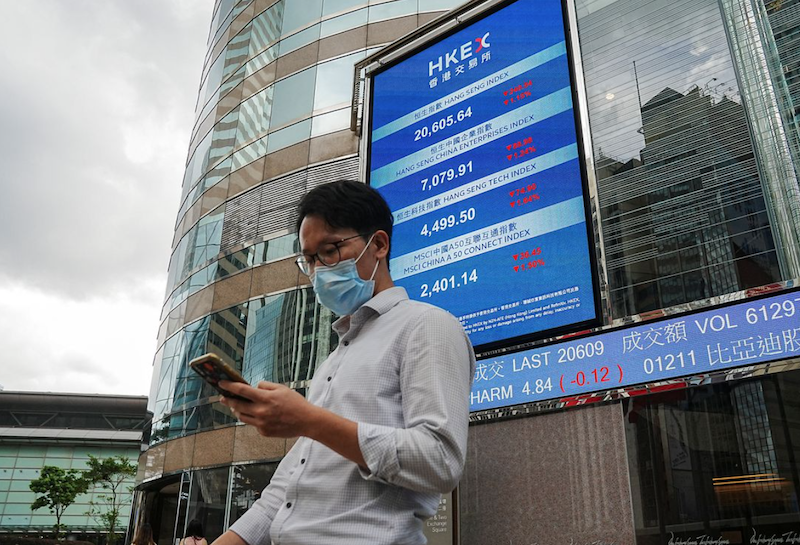Investors from the Chinese mainland have reportedly ploughed a record $90 billion into Hong Kong shares in the first half of 2025.
The Hang Seng Index has risen by a formidable 21% over the first six months of this year, lured by lower valuations and a belief that the city’s more international market is better value than Shanghai, despite Beijing’s growing rivalry with Washington.
The influx of cash has reshaped the landscape of a market that foreign investors have avoided for several years after Beijing imposed a hated national security law in mid-2020 that caused tens of thousands of residents to leave and live abroad.
ALSO SEE: Countries Should Not Sign Trade Deals at Our Expense: China
“The Hong Kong stock market is being repriced by mainland money,” said Chen Dong, fund manager at Hangzhou Ultraviolet Private Fund. Chinese money “is gushing in from various directions in a gold rush,” he said.
In stark contrast, China’s benchmark CSI 300 has barely moved. Disillusioned with the languid Shanghai market, low returns and a stuttering domestic economy, domestic investors have shifted money from onshore A-shares to Hong Kong-listed equities, where stocks typically trade at a discount.
Hong Kong’s H-share market has gained from robust flows via the cross-border link Stock Connect, a bumper string of initial public offerings (IPOs) and global investors diversifying away from a weakening US dollar.
For 40-year-old Chinese investor Zhu Haifeng, Hong Kong equities now account for 80% of his portfolio.
For a dual-listed company, “you certainly want to pay less for the same assets,” said Zhu, who bought Hong Kong-listed shares of Tsingtao Brewery and Guangzhou Baiyunshan Pharmaceutical – both trading at a sharp discount to their Shanghai-traded counterparts.
Mainland investors via Stock Connect now contribute to 50% of Hong Kong’s daily stock turnover, up from around 30% at the beginning of 2024, Societe Generale estimates.
Institutional money is gushing in too, causing the gap in dual-listed stocks to compress, although China’s capital controls ensure some variance remains.
The average premium of China’s A-shares over Hong Kong’s H-shares – traditionally high due to bigger volumes and activity in China – has narrowed to a five-year low of under 30%.
A ‘proxy of national champions’
The tighter spreads potentially reduce the incentives for mainland investors to buy H-shares, but analysts expect Hong Kong’s bull run to continue.
US President Donald Trump’s erratic policies, fresh US rate cuts and bets on China’s technological innovations will drive more money into the former British colony.
High-dividend bank shares in Hong Kong have attracted yield-focused investors such as Ping An Insurance and China Life, as long-term treasury yields flirt with record lows.
The dividend yield of an index tracking Hong Kong-listed Chinese companies stands at 3.7%, higher than the 2.9% ratio for Chinese benchmark CSI 300 according to LSEG data. That compares with China’s 10-year bond yield of 1.65%.
Hong Kong has evolved into a proxy of “national champions,” Linda Lam, head of equity advisory for North Asia at UBP said, referring to Hong Kong’s tech-heavy listings.
In comparison, mainland A-shares have a lot more macro-sensitive sectors, weighing on investor sentiment, she said.
Goldman Sachs this month published a list of 10 “prominent” Chinese companies with “buy” recommendations, most of which are not listed on the mainland.
They include Tencent Holdings, Alibaba Group and Xiaomi – companies invested in artificial intelligence and holding sway in China’s tech war with the United States.
Guo Changzhen, a retail investor based in China’s central Henan province, started buying Hong Kong’s high-dividend shares late last year.
“Chinese bond yields are low, deposit rates are low, so where else do you put money without too much risk-taking?” said Guo, who owns Chinese companies listed in Hong Kong but not at home.
Wang Yi, chief investment officer of CSOP Asset Management, said he remains bullish on Hong Kong stocks.
“We have seen more global investors turning their attention back to the market,” he said.
- Reuters with additional editing by Jim Pollard
ALSO SEE:
China’s CATL Looking to Raise $4 Billion In Hong Kong Listing
Germany Tells Apple, Google: Cut DeepSeek From App Stores
Trump ‘Doesn’t Want’ Apple to Tie-Up With Alibaba AI in China
China’s Huawei ‘Hoping Its New AI Chip Can Outpower Nvidia’
US to Review Ties With Hong Kong Banks, ‘City Now a Crime Hub’
Hong Kong Security Law Has Global Firms Racing to Shield Secrets
Hong Kong Battles to Boost Appeal, Business After Clampdown
Hong Kong Banks on China Links to Restore Global Status
























